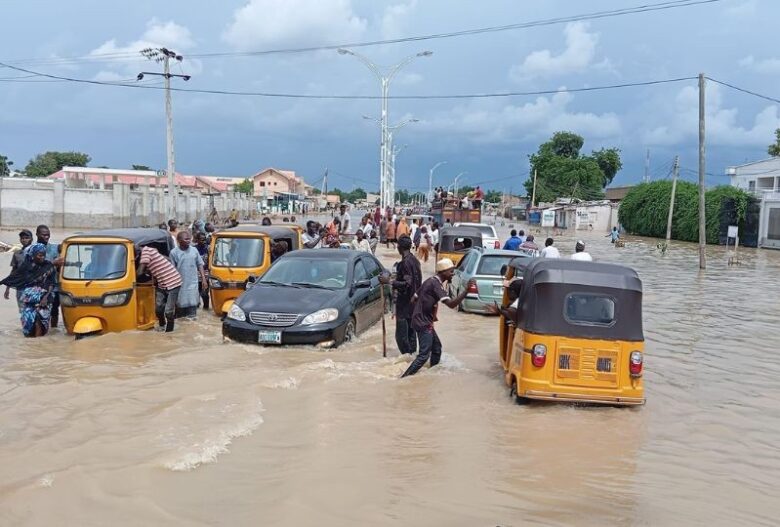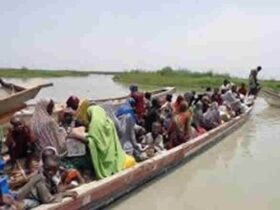Severe flooding in the northeastern Nigerian city of Maiduguri has claimed at least 30 lives, affected one million people, and forced 400,000 people from their homes.
The disaster followed the collapse of the Alau Dam, which overflowed its banks, sending floodwaters from about 10 kilometres away into Maiduguri.
“The death toll is 30,” National Emergency Management Agency (NEMA) spokesman, Ezekiel Manzo, told AFP.
“The situation in Maiduguri is quite frightening,” said Manzo’s NEMA colleague Zubaida Umar.
“The flood has taken over around 40 percent of the entire city. People have been forced out of their homes and are scattered everywhere.
“From our statistics, we have 414,000 displaced people,” Umar said. He told the BBC’s Hausa language service that officials feared that number could reach one million.
The UN refugee agency in Nigeria said on X Tuesday the flooding was the worst to hit the city in 30 years.
Government intervenes
Nigeria’s President Bola Tinubu expressed deep concerns over the flooding and tasked relevant government agencies to expedite rescue efforts while Vice President Kashim Shettima arrived in the Borno capital Tuesday to conduct an on-the-ground assessment of the devastating floods.
Tinubu also called for the immediate evacuation of residents in communities overtaken by floods.
The Governor of Borno State, Babagana Zulum, told journalists that a preliminary assessment conducted by the government showed that more than a third of Maiduguri was flooded, which affected an estimated one million people following the heavy flooding.
“The floods covered one-third of the city, affecting over one million people. It is very devastating,” Zulum said while distributing cash and food to thousands of displaced persons at a camp.
Zulu added that the Federal Government allocated N3bn for rehabilitation of the victims, adding that the funds would be used to provide food and other essential supplies, as well as support long-term strategies, including health monitoring to prevent disease outbreaks.
The governor also announced that cash distributions of N10,000 per household have been made to flood victims.
In addition, the state government organised search and rescue operations to assess casualties and gather data on those affected.
“We are distributing money and food to head of each of the families as a temporary measure to cushion the impact,” he said.
Luckily for us, we just received N3bn flood intervention fund from the Federal Government. So, we are using part of this fund to provide immediate support to the communities affected by the flood.
“We have separated them into different camps and already providing support. We will come up with long-term and short-term measures as soon as we take the data of the people affected.”
Victims ordeal
Despite efforts by the FG and the state government to evacuate victims of flood to IDP camps, some victims slept on roads following the disaster.
The victims, comprising children and women around Al-ansar Mosque along the Polo Road, told our correspondent they preferred the roads than going to the IDP camp.
One of the flood victims, Hassana Shaibu, a mother of four children, said they slept under a tree close to the road on Wednesday because she got the news of the IDP camp late and could not locate the place.
“I got the news that people can go to the IDP camp at the late hour, and I couldn’t move around at night with my children. So, since this place is close to the mosque and there is light, me and my friend, who has two children, decided to pass the night here,” Shaibu said.
Another victim, Salisu Fatti, added, “I heard stories of how camps used to be. Its better I stay here that I am sure is safe. Hopefully, tomorrow (today) before evening, I will go back to Modugari, where my house is. There’s the possibility the water must have subside.
A Red Cross official Abass Mohammed narrated how a family of a resident of Custom area sailed through the flood to a flyover for safety.
The man, identified as Abacha, carried two of his children while his wife had a child as they all scampered through the raging flood to the bridge.
“He (Abacha) was sure that no matter how high the flood got, it won’t overflow the bridge. It’s obvious he had lost his property but grateful that none of his kids were swept by the flood,” Mohammed said.
Since the start of the rainy season in Africa’s most populous country, floods have killed 229 people and forced more than 380,000 people to flee, according to NEMA’s figures.
The torrential rains have also least 107,600 hectares (265,000 acres) of farmland were also damaged by the torrential rains.
YOU MAY ALSO READ: Uganda’s Economic growth to surge as Oil production begins, says IMF









Got a Question?
Find us on Socials or Contact us and we’ll get back to you as soon as possible.